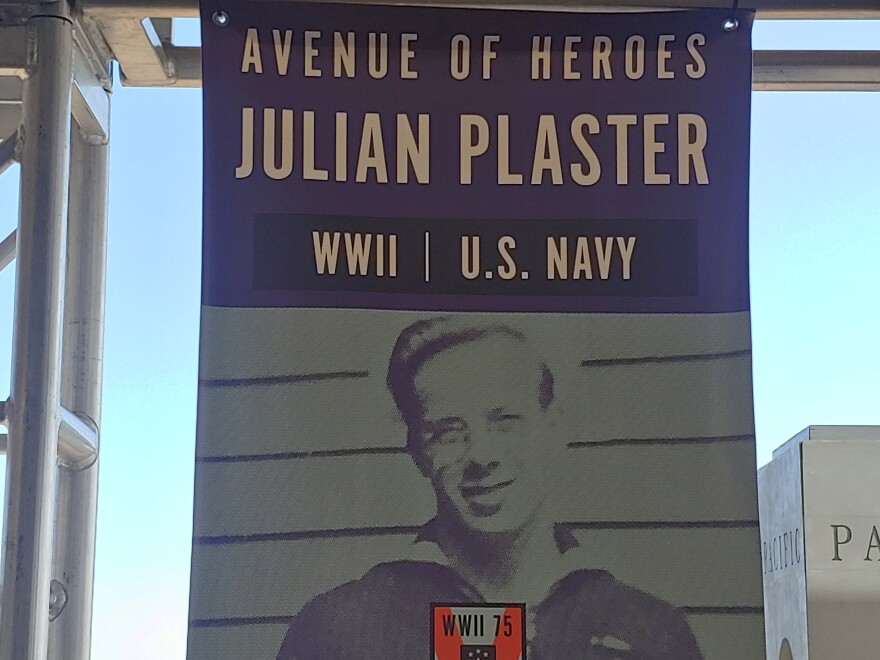It happened during the first week of September in 1945: Japan signed formal surrender papers aboard the USS Missouri in Tokyo Bay, bringing an end to World War II.
This week, Milwaukee's War Memorial Center marked the 75th anniversary of the signing with a ceremony that included World War II veterans and advice about what it takes to keep nations out of wars.
The figures from World War II remain staggering. Fifteen million battle deaths. At least three times that many civilians died, maybe many more. In the Milwaukee area alone, nearly 3,000 service members gave their lives defending the U.S.
So, when World War II veteran Julian Plaster made a comment to the War Memorial audience that wasn't in the script as he called it, you got the sense he was still feeling the pain of all that death and destruction, right from the start of U.S. involvement.
"The military in Pearl Harbor did not give their lives for us. They were stolen viciously and attacked. And many times, when I'm out giving a little sermon, people will say, 'You weren't very nice to the Japanese.' I look at them and say, ‘We didn't start the war. And we sure as heck don't have to apologize for it,' " Plaster said.

Japan's prime minister did not apologize for the attack on Pearl Harbor when he visited Hawaii four years ago. But notably, he offered "sincere and everlasting condolences" for the victims. He also emphasized the strides that two nations have made in the last 75 years as allies and vowed never to repeat "the horrors of war."
Plaster, who served in the Navy in the Pacific, and now lives in Milwaukee, told WUWM that part of his concern about war deaths stems from a battle zone experience.
"In the night, I was in the tent with six. The next morning, there was only three of us. You lose friends, you don't think too much about it at that time. But as time goes by, you remember that,” Plaster said.
But Plaster is also an advocate for tolerance and respect, saying not everyone has learned the lessons of World War II.
"We've got to learn to respect our enemies — whether it's in sports, religion or politics. We've just got to learn. We don't have to agree with 'em. But let's just learn to respect them for what they do and what they believe in,” he said.
"We've got to learn to respect our enemies ... We've just got to learn. We don't have to agree with 'em. But let's just learn to respect them for what they do and what they believe in." - Julian Plaster
Another veteran, Bernard Dearey, who served stateside in the Army during the war and now lives in New Berlin, also promotes peace.
"I wish everybody would just get together, and harmonize the whole world, you know. It doesn't seem to happen yet, anyway,” Dearey told WUWM.
It's not just World War II vets who advise avoiding conflict. Gulf War and Army veteran Michael Koszuta is from Waukesha. Koszuta says his father served during World War II and left a lesson both for individuals and nations.
"Be satisfied with what you need because excessive anything makes you become a person that will want for more,” Koszuta said.
Koszuta serves on the War Memorial’s Board of Directors and is chair of the center's 75th commemoration of World War II. That includes hosting the only traveling replica of the Washington D.C., World War II memorial on the center's plaza through the end of Sept. 3.
In addition, an On the Homefront exhibit will be inside the center through the end of this year. That display honors Milwaukee manufacturers and workers who repurposed and contributed to the war effort.

The exhibit also includes memorabilia from Milwaukee families whose loved ones served in the war. There's even a Western Union telegram informing a mother who lived on East Kenilworth Place that her son, Lt. Cmdr. George William Fox, was killed in action.
Center President and CEO Dan Buttery says it's another reminder of the tragedy of war.

"I'm a combat veteran, and I will say, exhaust all options before you make that decision because it tends to seem easy to send our young into war. But they can never seem to figure out why we're there, or how long we're there,” Buttery said.
Buttery served in Iraq in 2003-2004. With all the World War II veterans now in their 90s, it may soon be up to the veterans of wars in Korea, Vietnam, and the various conflicts in the Middle East to personally deliver the message of what armed battle is really like.



